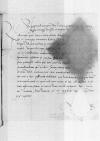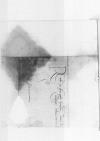List #1074
Sigismund I Jagiellon do Ioannes DANTISCUSVilnius, 1534-01-04
| odebrano [1534]-01-12 Rękopiśmienne podstawy źródłowe:
Publikacje:
| ||||||
Tekst + aparat krytyczny + komentarzZwykły tekstTekst + komentarzTekst + aparat krytyczny
Reverendo in Christo Patri, domino
Reverende in Christo Pater, sincere nobis dilecte.
Displiceret nobis text damaged⌈[eret nobis]eret nobis text damaged⌉ [...] text damaged⌈[...][...] text damaged⌉ter, si generosus
Dat(ae) or Dat(um)⌈Dat(ae)Dat(ae) or Dat(um)⌉
Ad mandatum re paper damaged⌈[mandatum re]mandatum re paper damaged⌉giae maiestatis propri paper damaged⌈[maiestatis propri]maiestatis propri paper damaged⌉um


 AGAD, AZ, 2999, f. 116v
AGAD, AZ, 2999, f. 116v